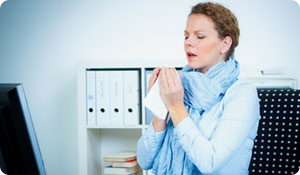
The human body is a fascinating machine capable of accomplishing complex tasks ranging from the physical, running a marathon; to the intellectual, solving math proofs; to the emotional, maintaining deep personal connections with others.
No other creature on the planet is able to achieve what humans can, and yet it is some of the simpler, more innocuous actions that are the most captivating. Here, we investigate the science behind why our bodies' sneeze, cough, hiccup, and burp—things we all do but few of us understand.
The Sneeze
The sneeze is one of the body's chief methods for expelling germs. According to Discovery.com, "One sneeze leaves the body at about 100 mph, carrying as many as 100,000 pathogens with it." Basically, a sneeze is a breath taken to extremes. It starts with the tickle you feel in the back of your nose, known as the sensitive phase. This tickle triggers a response in the trigeminal nerve, which is connected to the lateral medulla—the sneezing part of your brain. Once the message is sent to the lateral medulla the following processes take place:
- You take a deep breath while simultaneously closing your eyes.
- The abdominal and other muscles contract forcing air out of the body.
- The roof of your mouth shifts, which allows air to move out of the mouth and nose at the same time.
Fun fact: People don't sneeze when they are asleep because the nerves involved in nerve reflex are also resting.
The Cough
Like sneezing, coughing also expels germs from the body. Instead of being triggered by the trigeminal nerve in the face, a cough is a response to foreign material or mucus in the lungs or upper respiratory passages. When an irritant is detected, mucus is secreted. Sensing the mucus build-up, the tiny air tubes in the lungs contract. Nerves in the lungs send a message to the medulla oblongata—the coughing part of your brain. Then the cough is triggered. There's a small intake of air, the vocal chords close, pressure in the lungs increases, the chest contracts, and releases the cough.
Fun fact: The average human cough would fill about three-quarters of a two-liter soda bottle with air.
The Hiccup
Quite possibly the most annoying and difficult bodily function to quell, the hiccup is fascinating. While scientists know how they happen, many are unsure of what purpose they serve. Essentially, a hiccup is forced intake of air and the result of muscle spasms in the chest. According to William A. Whitelaw, a professor in the department of medicine at the University of Calgary, in an article published on ScientificAmerican.com, a hiccup follows these processes:
- The diaphragm and the complete set of inspiratory muscles make a sudden, very strong, contraction.
- Before the diaphragm contracts, the roof of the mouth moves up, along with the back of the tongue.
- The expiratory muscles become inhibited.
- Just after the contraction of the diaphragm and inspiratory muscles begins, the vocal chords clamp shut, making the "hic" sound.
Fun fact: The record for the longest hiccupping fit is held by a pig farmer named Charles Osborne from Anton, Iowa. He began hiccupping in 1922 and continued until 1990.
The Burp
A burp is caused when air is essentially swallowed while eating or drinking. The excess air is then expelled, which is typically oxygen and nitrogen. However, when drinking carbonated drinks, such as soda or beer, the excess gas build up and subsequent expelling is comprised of carbon dioxide.
The sound of a burp is caused by the vibration of the upper esophageal sphincter—a series of muscles that allows food and liquids to pass into the esophagus—as the gas bypasses it.
Sources:
Anatomy of a Sneeze and Cough
http://www.washingtonpost.com/wp-srv/health/interactives/cold/
Belching
http://www.localhealth.com/article/belching
The Science of Sneezing
Tracy V. Wilson
http://dsc.discovery.com/tv/time-warp/articles/sneezing.html
Does Anything Work for a Cough
Jenny Pogson
http://www.abc.net.au/health/thepulse/stories/2011/06/30/3255291.htm
What Causes Hiccups?
William A. Whitelaw
http://www.scientificamerican.com/article.cfm?id=what-causes-hiccups





